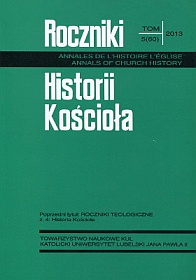Terribilis auctoritas and auctoritas of the Holy Bible, According to Saint Augustine
Abstract
This paper touches upon a crucial motive in the evolution of the spirituality of St. Augustine: the authority of the Holy Bible, which he had first rejected on his reading Hortensius Cicero. Cicero’s work, being in itself an invitation to philosophy, raised St. Augustine love of wisdom (philosophia). In its latter part, this article discloses the reason why the Doctor of Grace adhered to the Manichean doctrine, which he found attractive for its promise to give access to truth without reference to the authority of the faith (terribilis auctoritas).
This article gives the reader a chance to follow the path of St. Augustine’s spiritual growth. Despite his Christian roots and education, bequeathed to him by his Saint mother Monica, his juvenile pride and his overambitious attitude made him reject the authority of the Holy Bible, which he found at tangent with his own intellectual needs. In short, he rejected the authority of the faith and regarded it as useless, since it raised his anxiety and terror (terribilis auctoritas). This is why he subscribed to the Manichean doctrine, which promised a completely rational comprehension of truth.
References
Marrou H. I.: S. Agostino e la fine della cultura antica, Milano 1987.
Bellini E.: I Padri nella tradizione cristiana, Milano 1982.
Copyright (c) 2013 Roczniki Historii Kościoła

This work is licensed under a Creative Commons Attribution-NonCommercial-NoDerivatives 4.0 International License.

